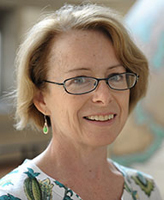 Julia Douthwaite
Julia Douthwaite
Two professors of French and Francophone studies in Notre Dame’s Department of Romance Languages and Literatures are bringing recognition to little-known literature of the past and present.
Through individual and joint research projects, Professor Julia Douthwaite, a specialist in 18th and 19th century French literature, and Associate Professor Alison Rice, an expert in French-language texts from the 20th and 21st centuries, are working toward this common goal.
“We both aim to reveal the important dialogues between canonical authors and their lesser-known counterparts,” Douthwaite says, “and so can both of us be seen on the same side of the ideological divide between high culture and popular culture, fighting to bring acknowledgment to the underdogs of French society.”
Reaching Outside the Canon
Douthwaite’s new book, The Frankenstein of 1790 and Other Lost Chapters From Revolutionary France (University of Chicago Press), explores works produced during the turbulent years surrounding the French Revolution.
“This project began as a comparison of political history and literature and grew into an excavation of little-known documents from this period to see which symbolic stories from the Revolution held the greatest sway over authors’ imaginations in later generations,” she says.
“One of my goals is to bring to light the missing links between the ancien régime and modernity—to reveal continuities across the traumatic divide of Revolution, from the 1780s on one hand to the Romantics of the 1830s and beyond on the other.”
 Alison Rice
Alison Rice
Rice’s current book project, Francophone Metronomes: Worldwide Women Writers in Paris, builds on the work of her previous books, one of which, Polygraphies: Francophone Women Writing Algeria, was published in August 2012 by University of Virginia Press.
In Francophone Metronomes, Rice investigates a larger phenomenon currently taking place in Francophone women’s writing: the widespread desire by women from unexpected places to express themselves in French.
“Women from the former French colonies did not start publishing until the 1970s,” Rice says, “therefore, Francophone women’s writing is a relatively recent development in literary history. At present, the few pioneers who began writing 40 years ago are joined by a surprising variety of women from around the world who have chosen the French language as their literary idiom for different reasons. This book is a study of young women writers who have just begun publishing alongside more established, ‘canonical’ authors.”
Spanning the Centuries
Douthwaite’s and Rice’s research doesn’t end with their individual projects. They are also working with one another on a research project with Indiana University (IU) Bloomington that includes workshops and a conference planned for 2013 called Circulating French in the Classroom.
“Our research project with IU Bloomington involves interdisciplinary, intergenerational study that seeks to unveil the relationship between works composed in French across the centuries,” Rice says. “It is especially concerned with effective teaching techniques that emerge from conversations that are expansive and wide reaching, rather than focused solely on a particular moment in French writing.”
Douthwaite says it will be a challenge to convince scholars of earlier periods of French history to invest time and energy on learning about new works by authors lesser known to the canon, but she and Rice believe their efforts will provide a model for the field.
“I am willing and eager to get going on this new program of reading and learning,” she says, “because of the political engagement it represents—a project to put well-known French literature of ‘the Hexagon’ (France) on an equal footing with writings published by less famous or more contemporary authors writing and publishing in French but outside of France or traditional power relations.
“This is a democratic move. It opens up dialogue to new members. It invites readers and students to enjoy contact with writers who have been ignored by the keepers of the French tradition.”
Keeping the Strangeness Alive
In addition to discovering new connections between early and contemporary French writing, Douthwaite and Rice agree that celebrating the points where these works differ is also critical.
“Professor Douthwaite and I are both engaged in scholarship that seeks to uncover the value of written work that is presently unrecognized,” Rice says. “We believe that a compelling way of unveiling new or newly discovered work is through juxtaposition. Placing diverse texts in conversation in our own analyses allows us to make important connections and identify crucial points of divergence.”
Douthwaite calls their plan “ambitious” but says that with focused and careful work, she and Rice can gradually build a body of scholarship.
“Juxtaposing texts published in distant times and far-flung places must not entail flattening them to be palatable to our taste or appreciating only those aspects that appeal to our multicultural, feminist, or postcolonial sensibilities,” Douthwaite says. “It does not mean bringing contemporary value judgments to bear on the racism, classism, sexism, or other prejudices implicit in older texts.
“It means keeping the strangeness alive, enjoying it for what it reveals about the human condition in other times and places.”
Learn More >
- Department of Romance Languages and Literatures
- Julia Douthwaite faculty profile
- Alison Rice faculty profile
- The Frankenstein of 1790 and Other Lost Chapters From Revolutionary France
- Polygraphies: Francophone Women Writing Algeria
Originally published by at al.nd.edu on October 12, 2012.